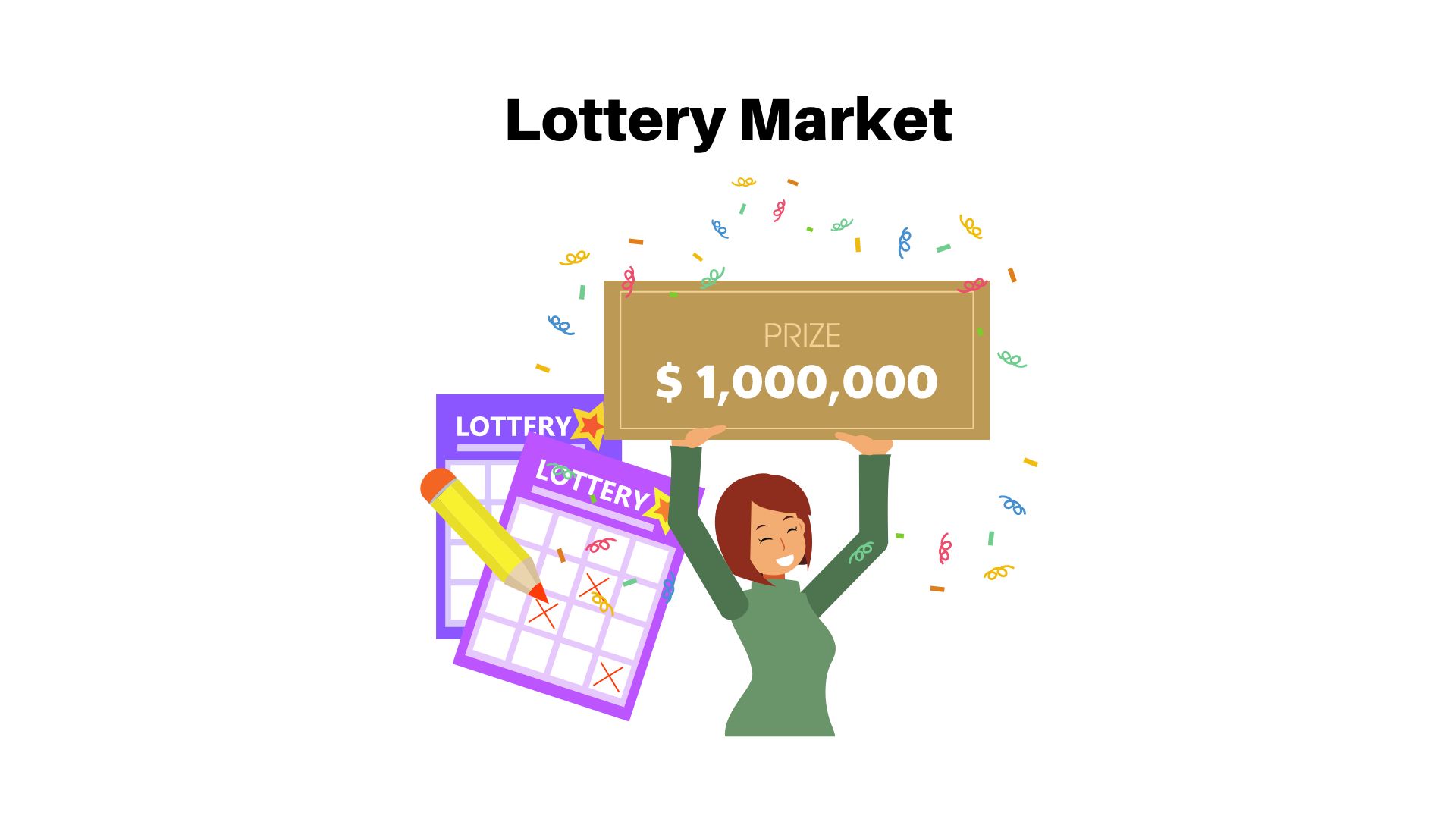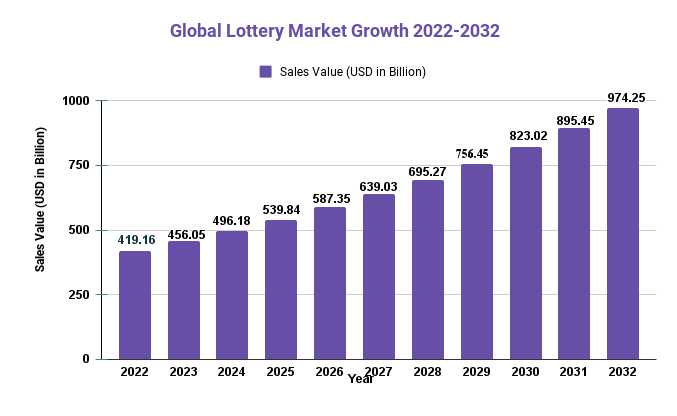Lottery Market Value USD 974.25 billion by 2032, Patent/Trademark Analysis | Growth (8.8%) by 2032

Page Contents
Market Overview
Published Via 11Press: The lottery market refers to an industry that involves the buying and selling of lottery tickets as well as related products, along with managing and operating lottery games. Lottery games usually involve selling tickets to customers who then have the chance to win prizes through random drawing or another random method. This market includes both traditional paper-based lottery games as well as digital ones, plus other related products like scratch-off tickets or instant win games.
The lottery market has experienced steady growth over the last several years. In 2022, the market size was valued at USD 419.16 billion and is forecast to reach a whopping USD 974.25 billion by 2032, growing at an annual compound growth rate (CAGR) of 8.8% from 2022-2032.
The lottery market is driven by several factors, including the rising popularity of online lottery games, rising disposable income, and an ever-increasing demand for entertainment. Unfortunately, it also faces challenges like stringent regulations and potential threats from illegal lotteries.
Government bodies typically regulate the lottery market, and lottery operators must adhere to stringent rules and regulations in order to guarantee the fairness and integrity of games. As a multi-billion dollar industry with global reach, lotteries must constantly evolve in response to changes in consumer behavior as well as technological advancements.
Would you like to access the statistical information, graphs, and key players' tactics? click here| https://market.us/report/lottery-market/request-sample
Key Takeaways
- The global lottery market is forecast to expand at an annual compound growth rate (CAGR) of 8.8% between 2021 and 2027, reaching a market size of USD 674.3 billion by 2027.
- Draw-based games maintained their leading market share in 2020, thanks to increasing demand for large jackpots and multi-state titles. Instant games are also seeing a surge in popularity due to their convenience and quick rewards.
- The lottery market is driven by several factors, such as the rising popularity of online lottery games, rising disposable income levels, and an ever-increasing desire for entertainment.
- However, the market also faces obstacles such as stringent regulations and potential illegal lotteries.

Regional Snapshot
- North America: The North American lottery market is forecast to experience steady growth due to the growing popularity of draw-based games and online lottery offerings. The United States leads this region, accounting for a substantial share of its regional market share.
- Europe: The European lottery market is highly regulated and fragmented. It's dominated by several established players, with demand for lottery games driven by large jackpots and multi-state games.
- Asia Pacific Lottery Market Outlook: The Asia Pacific lottery market is forecast to expand rapidly with increasing disposable income and growing consumer interest in entertainment. China currently leads this region's lottery industry, accounting for a substantial share of total sales.
- Latin America: The Latin American lottery market is forecast to expand at a moderate rate due to the rising popularity of online lottery games and sports lotteries. Brazil leads this region's market, accounting for an important share of sales.
- Middle East and Africa: The Middle East and Africa lottery market is expected to expand steadily due to the rising popularity of instant games and demand for online lottery games. This highly regulated sector sees demand driven by large jackpots as well as multi-state games featuring multiple winners.
Drivers
- Increased Popularity of Online Lottery Games: The proliferation of internet connectivity and smartphones has enabled an exponential rise in the popularity of online lottery games. This has made these lottery games more accessible to a wider audience, leading to an uptick in demand for these titles.
- Rising Disposable Income: The increase in disposable income has translated to increased spending power and lottery games have become a popular form of entertainment. People are willing to shell out more money in anticipation of winning a large jackpot.
- Growing Demand for Entertainment: Lottery games have become increasingly popular as people find more leisure time to explore different forms of entertainment. Lottery games provide a thrilling and potentially profitable form of excitement.
- Lottery games with large jackpots and multi-state options: Lottery games featuring large jackpots and multi-state options have become increasingly popular in recent years, drawing in an enthusiastic audience that ultimately results in increased sales and revenues for lottery operators.
- Technological Advancements: Lottery games have become more sophisticated and accessible thanks to technological advances, creating new lottery products that appeal to a wider audience.
Before obtaining this research, find out more about it or ask any questions you have at| https://market.us/report/lottery-market/#inquiry
Restraints
- Strict Regulations: Lottery markets are subject to stringent regulations, which may restrict growth within the industry. Governments and regulatory bodies often impose limits on advertising, marketing, and sales practices which makes it challenging for lottery operators to expand their businesses.
- The threat of Illegal Lotteries: The lottery market faces the possibility of illegal lotteries, which could compete with legal lottery games and draw customers away from legitimate lottery operators. Illegal lotteries also present a risk to consumers since they are unregulated and may not offer the same level of protection as legitimate lottery games.
- Competition from Other Forms of Entertainment: Lottery games must contend with competition from other forms of entertainment, such as online gaming, sports betting, and other gambling activities. As a result, lottery operators must continually innovate and offer new products in order to remain profitable.
- Lack of Innovation: Some lottery operators have been hesitant to adopt and innovate their products despite the industry's rapid technological advancements. Due to a lack of variety among lottery games, customer interest may decline.
- Economic downturns: When the economy is weak, people have less money to spend, which could be harmful for the lottery industry. Consumers may be less likely to spend money on lottery games during challenging economic times, resulting in fewer sales and earnings for lottery operators.
Opportunities
- Expansion into New Markets: The lottery market has the potential to expand into new areas and regions, particularly those where disposable income is increasing and demand for entertainment increases.
- Introduction of New Games and Products: Lottery operators can introduce games and lottery products that appeal to a wider audience, such as instant win games or ones with interactive elements. Doing this helps attract new customers while keeping existing ones satisfied.
- Integration of Technology: Technology, such as mobile apps, online platforms, and social media, can enhance accessibility for customers. It also presents lottery operators with an opportunity to collect data and customize their offerings accordingly.
- Partnership with Sports Leagues and Teams: Lottery operators can collaborate with sports leagues and teams to offer sports-themed lottery games, which may draw in a wider audience and generate additional revenue.
- Expansion of Online Lottery Games: The expansion of online lottery games presents lottery operators with an opportunity to reach a wider audience, especially younger consumers who are more likely to play these games.
Challenges
- Consumer Behaviour Alterations: With the rise of online gaming and other forms of entertainment, consumer behavior for entertainment and gambling is evolving quickly. Lottery operators must adjust to these changes by offering new products and services that appeal to users.
- Regulatory Environment: The lottery market is highly regulated, and operators must abide by stringent rules and regulations. Any changes in regulations or increased scrutiny from regulatory bodies could make it challenging for lottery operators to operate and expand their businesses effectively.
- Competition from other forms of gambling: The lottery market faces stiff competition from other forms of gambling, such as online gaming, sports betting, and casino games. Lottery operators must find ways to differentiate their products and services from these alternatives in order to attract and retain customers.
- Technological Advancements: While technology offers opportunities for the lottery market, it also presents challenges. Lottery operators must stay abreast of technological advances and adopt new ones in order to remain competitive.
- Social Issues: Gambling can be linked with social problems such as addiction, and lottery operators must be mindful of these matters and take steps to address them. Neglecting to address these matters could result in negative publicity and damage the reputation of the lottery industry.
Recent Developments
- In spite of the industry's rapid technological advancements, some lottery operators have been hesitant to adopt and innovate their products. As a result, there might not be enough distinction across lottery games, which might lower consumer interest.
- Economic downturns: When there is less money available to spend, the lottery market may be badly impacted. Customers might be less likely to spend money on lottery tickets during tough economic times, which would mean decreased sales and profits for lottery operators.
Key Market Segments
Type
- The Lotto
- Quizzes Lottery
- Numbers Game
- Scratch-off Instant Games
Application
- Online Lottery
- Lottery Store
Key Market Players
- China Welfare Lottery
- China Sports Lottery
- Hong Kong Jockey Club
- Francaise des Jeux
- Camelot Group
- Loterías y Apuestas del Estado
- Mizuho Bank Ltd.
- Singapore Pools
- California Lottery
- Florida Lottery
- GTECH
- New York State Lottery
- INTRALOT
- MDJS
- Connecticut Lottery Corporation
- Berjaya Sports Toto Berhad
- Magnum
- Minnesota State Lottery
- Tennessee Education Lottery Corporation
Report Scope
| Report Attribute | Details |
| The market size value in 2022 | USD 419.16 Bn |
| Revenue forecast by 2032 | USD 974.25 Bn |
| Growth Rate | CAGR Of 8.8% |
| Regions Covered | North America, Europe, Asia Pacific, Latin America, and Middle East & Africa, and Rest of the World |
| Historical Years | 2017-2022 |
| Base Year | 2022 |
| Estimated Year | 2023 |
| Short-Term Projection Year | 2028 |
| Long-Term Projected Year | 2032 |
Frequently Asked Questions
Q: What is the current market size of the Global lottery Market?
A: The Global lottery Market was valued at USD 419.16 billion in 2022, according to a report by Market.us. The market is expected to grow at a compound annual growth rate (CAGR) of 8.8% from 2022 to 2032, reaching a value of USD 974.25 billion by 2032.
Q: Who are the key players in the Global lottery Market?
A: Some of the key players in the Global lottery Market include China Welfare Lottery, China Sports Lottery, Hong Kong Jockey Club, Francaise des Jeux, Camelot Group, Loterías y Apuestas del Estado, Mizuho Bank Ltd., Singapore Pools, California Lottery, Florida Lottery, GTECH, New York State Lottery, INTRALOT, MDJS, Connecticut Lottery Corporation, Berjaya Sports Toto Berhad, Magnum, Minnesota State Lottery, Tennessee Education Lottery Corporation.
Q: What segments are covered in the Global lottery Market Report?
A: The Global lottery Market is segmented based on type (The Lotto
Quizzes Lottery, Numbers Games, Scratch-off Instant Games), Applications (Online Lottery, Lottery Store), and Geography.
The team behind market.us, marketresearch.biz, market.biz and more. Our purpose is to keep our customers ahead of the game with regard to the markets. They may fluctuate up or down, but we will help you to stay ahead of the curve in these market fluctuations. Our consistent growth and ability to deliver in-depth analyses and market insight has engaged genuine market players. They have faith in us to offer the data and information they require to make balanced and decisive marketing decisions.



